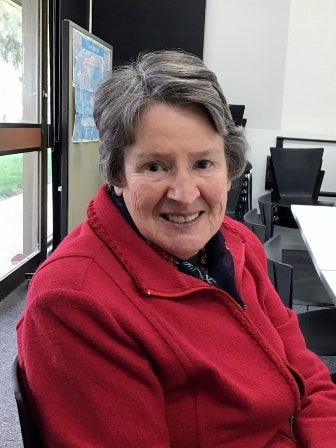I was born in Violet Town Bush Nursing hospital in January 1939, the year World War II began. It was an extremely hot year in Victoria with bad fires that January, extending from Narbethong to Powelltown, causing much loss of property and lives. Mum told of smoke hanging over the town for days, stinging the eyes and even tainting the tank water. In February there was a substantial rain that caused floods.
Kensay Park, our farm, approximately 5 miles from Violet Town, was bought by Grandad Earnest King in 1933. The house, built on the banks of the 3 Mile Creek, was a 4-bedroom weatherboard house with a large front verandah which was later fly wired in.
There was no electricity. Hot water was provided by a cast iron fountain on the side of the black wood stove for dish washing and baths. A copper was lit on wash days and clothes boiled or hand washed, then wound through a wringer and hung on a long line out on the bank of the creek. There was water laid on to the bathroom, laundry and a tap low on the wall in the kitchen. Washing up was done in a tin dish on the kitchen table and drained on a tray. The stainless-steel sink followed much later, as did the slow combustion stove with hot water service. Mum’s first washing machine was a Lightburn, closely resembling a concrete mixer. Water still had to be ladled into the machine and clothes lifted into a spin dryer, but it was a vast improvement on lifting clothes from the boiling copper to the trough and pushing through hand wringer. Water was scarce, so it was recycled to the garden.
Mum must have found it difficult with a small baby! There was no electricity, so no fan or air con- conditioner, but I survived! There was no refrigerator. A Coolgardie safe (cooled by damp bags draped on the sides) kept meat and milk fresh for a limited time, but butter was always runny in summer and jellies out of the question. A kerosene refrigerator came much later and was a great help. Grandma King sometimes made ice cream, a real treat served with her home-grown strawberries.
Our means of transport was a green Bedford truck, a lidded box on the back for groceries bought every 1-2 weeks. Dad had a large vegetable garden with lots of fruit trees. I remember apples, apricots, peaches, pears and apricots, which mum bottled and made into jam. There were two large fig trees, big enough to climb, and well-watered from the bathroom drain. Fig jam was my favourite. Water was pumped from the big hole in the creek, so we had home-grown vegies most of the year. Tomatoes were bottled, made into sauce and relish for later. Beans were sliced and salted in a large earthen ware jars (but not as nice as fresh).
It was a quiet childhood, perhaps a bit lonely, as my brothers were a fair bit younger, but there were pet lambs, farm dogs and a pet rabbit till it escaped. I didn’t have children nearby to play with, so I learned to use my imagination and play with dolls and draw on any available scrap of paper.
I only have a vague memory of the war years, but understood my parents were worried about it. Mum had a soldier brother in Darwin who she often wrote to. Blinds were drawn at night, extended shade on lights and limited lights on vehicles, so towns were not so visible from the air. A rather exaggerated precaution for our part of the world! Night driving was hazardous on windy wet roads, especially in winter, when they were muddy and slippery.
As there were no school buses, when I got to school age, I did correspondence school at home. In 1945 when I turned 6, I stayed with my grandparents in Violet Town during the week. School was a new experience. I was like a small fish in a large pond, not knowing many children. I was put straight into Grade 2, where I was a year younger than the others. I found settling in hard, being a shy, anxious child away from home. I’m sure Grandma King did her best, but having had boys, a little girl was a challenge. Unfortunately, I broke my arm at Easter and, after time away, had to settle in again. By grade 3 I was happier. I had received a green Malvern Star bike for Christmas, and I could ride around to visit my other grandparents. Violet Town was a very quiet and safe town in the 40’s.
In 1945 the war ended. I remember the day well. Mum and Dad came into town for lunch, it was a holiday. The school bell rang constantly, and I sneaked over for a turn at ringing it! I remember an impromptu parade of young people around the town on bikes. The older people seemed relieved.
Things gradually returned to normal, the rationing gradually stopped. We hadn’t been greatly affected by it, as we had plenty of home killed meat, rabbits, milk and butter and our vegetables. Fuel and clothing tickets were barely sufficient, but a lot of swapping went on.
I do remember that after the war we got a new tractor and the old draft horses, Queenie and Violet were put out to rest.
A new era had commenced.
Margaret Nelson
June 2020


 RSS Feed
RSS Feed
